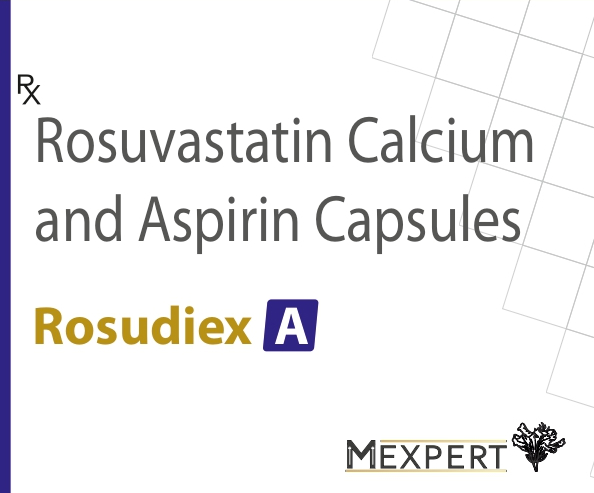Anti-dyslipidemic
Rosudiex A
| Marketed By : | Mexpert Healthcare |
| Composition : | Rosuvastatin Calcium and Aspirin |
| Class : | Anti-dyslipidemic |
| Dosage Form : | Capsule |

Genuine Products

Cost Effective
Rosudiex A Cap. (Rosuvastatin 10mg + Aspirin 75mg)?
Rosudiex A Cap. is a combination medication designed to address multiple aspects of cardiovascular health. It contains two active ingredients: Rosuvastatin, a statin that helps lower cholesterol levels, and Aspirin, an antiplatelet agent that reduces the risk of blood clot formation.
Rosuvastatin
Class and Mechanism of Action:
Indications:
Dosage and Administration:
Efficacy:
Side Effects:
Aspirin
Class and Mechanism of Action:
Indications:
Dosage and Administration:
Efficacy:
Side Effects:
Rosudiex A Cap. is a combination medication designed to address multiple aspects of cardiovascular health. It contains two active ingredients: Rosuvastatin, a statin that helps lower cholesterol levels, and Aspirin, an antiplatelet agent that reduces the risk of blood clot formation.
Rosuvastatin
Class and Mechanism of Action:
- Rosuvastatin belongs to the statin class of medications. It inhibits HMG-CoA reductase, an enzyme involved in cholesterol synthesis, thereby reducing the production of cholesterol in the liver.
Indications:
- Rosuvastatin is primarily used to lower elevated cholesterol levels in the blood. It helps reduce LDL cholesterol (often referred to as "bad" cholesterol) and triglycerides while increasing HDL cholesterol ("good" cholesterol).
Dosage and Administration:
- The dosage varies based on individual factors such as the patient's cholesterol levels and overall health. It is usually taken orally once a day, with or without food.
Efficacy:
- Rosuvastatin has been shown to be effective in reducing the risk of cardiovascular events in individuals with hypercholesterolemia.
Side Effects:
- Common side effects may include headache, muscle pain, abdominal pain, and nausea. Serious side effects are rare but may include liver problems and a condition called rhabdomyolysis.
Aspirin
Class and Mechanism of Action:
- Aspirin belongs to the class of nonsteroidal anti-inflammatory drugs (NSAIDs). It has antiplatelet and anti-inflammatory effects. Aspirin inhibits the activity of platelets, reducing their ability to form blood clots.
Indications:
- Aspirin is commonly used for its antiplatelet effects in preventing blood clot formation. It is often prescribed to reduce the risk of cardiovascular events such as heart attacks and strokes.
Dosage and Administration:
- The dosage varies depending on the intended use, but low-dose aspirin (typically 81 mg or 100 mg) is commonly used for cardiovascular protection.
Efficacy:
- Aspirin is widely used for secondary prevention in individuals with a history of cardiovascular events and, in certain cases, for primary prevention in individuals at higher risk.
Side Effects:
- Common side effects may include gastrointestinal discomfort. Aspirin use is associated with an increased risk of bleeding, particularly gastrointestinal bleeding.
